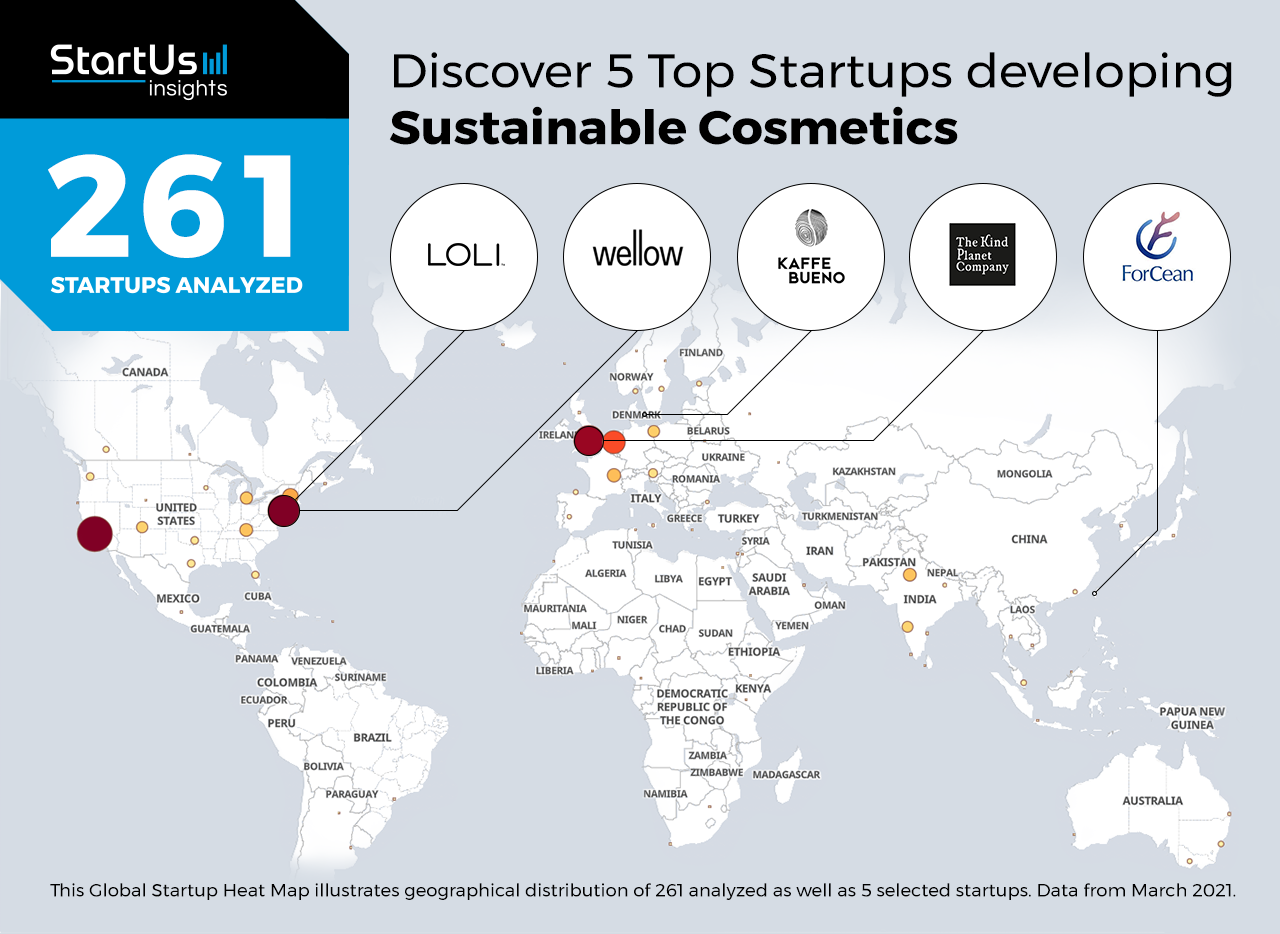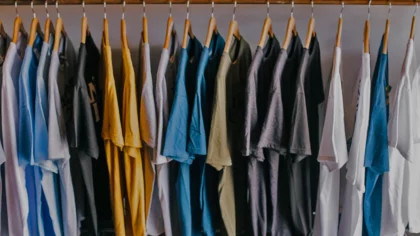Staying ahead of the technology curve means strengthening your competitive advantage. That is why we give you data-driven innovation insights into the FMCG industry. This time, you get to discover 5 hand-picked sustainable cosmetics startups.
Global Startup Heat Map highlights 5 Top Sustainable Cosmetics Startups out of 261
The insights of this data-driven analysis are derived from the Big Data & Artificial Intelligence-powered StartUs Insights Discovery Platform, covering 1.379.000+ startups & scaleups globally. The platform gives you an exhaustive overview of emerging technologies & relevant startups within a specific field in just a few clicks.
The Global Startup Heat Map below reveals the distribution of the 261 exemplary startups & scaleups we analyzed for this research. Further, it highlights 5 sustainable cosmetics startups that we hand-picked based on criteria such as founding year, location, funding raised, and more. You get to explore the solutions of these 5 startups & scaleups in this report. For insights on the other 256 sustainable cosmetics solutions, get in touch.
ForCean develops a Skin-Soothing Essence from Corals
The volume of plastic pollution in oceans is causing severe deterioration to marine ecosystems. Corals, an example, are generally used in the beauty industry on a large scale, further contributing to their disappearance. Hence, alternative methods, such as the regeneration of corals in labs for commercial consumption, potentially preserve the natural corals in the oceans.
Taiwanese startup ForCean grows corals by creating an artificial environment in their aquaculture lab. The company manufactures a repair and soothing essence, Laboral XB2, using corals. The product protects the skin from drying and prevents itching and related discomfort. The product is natural and eco-friendly. It has a gentle formula that does not contain parabens and artificial fragrances, making it sustainable for production and daily-use.
LOLI develops Zero-Waste & Organic Cosmetics
Due to the growing waste generated by cosmetics and their packaging, tonnes of trash end up in landfills, incinerators, and oceans. To tackle this problem, and address consumers’ environmental concerns, cosmetics startups develop alternatives to chemical ingredients by replacing them with food-based materials and zero-waste ingredients. This form of waste management also ensures that all products are reusable after used in production.
US-based startup LOLI manufactures cosmetics containing zero-waste ingredients. Some of their most sold products include rose water, organic face serum, makeup remover, and moisturizer. Moreover, all their packaging is plastic-free and completely recyclable. Their products are also environmentally-friendly, organic, and wild-harvested to avoid unnecessary waste during production.
The Kind Planet Company utilizes Organic Red Palm
Many cosmetics companies use petrochemical ingredients derived from petrol, a non-renewable and economically-volatile resource. Such ingredients are also harmful to the human skin in the long term. Hence, startups are now looking for alternatives to petroproducts in cosmetics that span oleochemicals, plant-based butter, and natural essential oils.
The Kind Planet Company is a British startup making a skincare line from sustainable organic red palm oil and shea butter. The product mimics the consistency of paraffin-based emollients. Their formulation helps the skin soothe eczema and skin irritation. The startup also empowers local women by hiring 43 land-owning African women, who indulge in extracting the shea butter and palm oil from nuts and trees.
Wellow develops Plant-based Packaging for Eco-Friendly Cosmetics
A lot of plastic deodorant tubes are tossed into oceans, rivers, and landfills every year. With governments’ delaying actions to stop pollution associated with single-use plastics, eco-minded startups are developing sustainable alternatives for packaging. In particular, plant-based packaging for daily-use products and cosmetics is gaining traction among industry players as well as consumers.
US-based startup Wellow packs its soaps, body washes, conditioners, shampoos, and deodorants in plant-based packaging that degrades in a few months as a backyard compost. Their products are also cruelty-free and contain no aluminum, parabens, toxins, or depletable resources, making them sustainable for regular use.
Kaffe Bueno manufactures Сoffee-based Additives for Cosmetics
Coffee has a chemical composition based on cellulose, hemicelluloses, proteins, lipids, and polyphenols. This composition also provides antiproliferative, antioxidant, and antimicrobial effects on the human skin. Hence, cosmetics startups utilize natural ingredients, such as coffee-based raw materials, to incorporate them into daily-use cosmetic and beauty formulations.
Kaffe Bueno is a Danish startup that manufactures its proprietary upcycled cosmetic raw material, Kaffibre. The product is derived from recycled coffee grounds and is useful as a natural exfoliating agent in face and body scrubs, masks, and soaps. They also collect coffee waste from corporate offices and hotels to recycle them and reuse them in cosmetics.
Discover more Sustainable Cosmetics startups
The 261 sustainable cosmetics startups, such as the 5 examples highlighted in this report, focus on eco-friendly ingredients and packaging, as well as sustainable ways to improve cosmetics production. While all of these technologies play a major role in advancing sustainable cosmetics, they only represent the tip of the iceberg. To explore more innovative FMCG technologies, simply get in touch to let us look into your areas of interest. For a more general overview, you can download our free Industry Innovation Reports to save your time and improve strategic decision-making.









